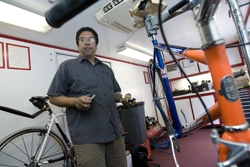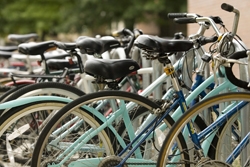Bike Temple aims to create a cycling-friendly culture
New initiative will link students, faculty and staff to bike-related information and resources.
Temple is launching a new initiative to build a bike culture on campus that will link students, faculty and staff to bike-related information and resources while promoting the university’s sustainability goals.
Bike Temple has been created in conjunction with Fuji Bicycles; Breakaway Bikes & Fitness, a Center City bike shop; and the Neighborhood Bike Works, a nonprofit organization headquartered in West Philadelphia.
“The initiative was begun as a way to make Temple more bike friendly,” said Glenn Eck, assistant superintendent of grounds in the Office of Facilities Management and a member of the bicycle subcommittee under the Office of Sustainability. “We want people to see bicycles as a reliable, routine form of transportation, not just a toy, or solely recreational.”
A campus survey conducted last spring found that many are interested in riding a bike for commuting to and from campus, but are hesitant because they don’t know where to purchase a bike or where to have it serviced. Respondents also indicated a need to learn bicycling skills that would give them a comfort level riding on busy city streets.
Eck said Fuji Bicycles, which has its Americas headquarters in Northeast Philadelphia, is offering about a dozen styles of bikes to Temple students and employees at a discount though Breakaway Bikes, which has opened an on-campus shop/repair facility outside Barton Hall on 13th Street, between Berks Mall and Norris Street.
Bike Temple is part of Temple’s total movement toward carbon neutrality and part of its climate action plan, said Sandra McDade, director of Temple’s Office of Sustainability.
“By biking to and from campus, you reduce the amount of greenhouse gas emissions that you put into the air,” she said.
“Many things that you do to reduce greenhouse gases have to do with behavior changes, and clearly the bike culture is very well organized in how it’s moving its agenda forward. I would like to see that culture change where people accept biking as a reasonable transportation alternative to driving or even taking public transportation.”
In addition to the practicality and sustainability aspects of bike riding, Eck said, Bike Temple will also promote the social aspects of biking.
“It’s amazing how many people across the university have an interest in biking,” he said. “The goal here is also to make this as much of a social network as possible; where people will have a venue through which they can meet people with similar biking interests. There’s a whole bunch of different populations within the biking community and we want people with similar interests to connect.”
In addition, said Eck, Neighborhood Bike Works will also be establishing a site adjacent to Temple’s main campus. The store will offer youth and adult bike programs in the community, as well as workshops for students and employees who may want to work on their own bikes.
One of NBW’s more popular programs is “earn a bike,” aimed at youths ages 8-17. It includes 14 two-hour after-school lessons that cover bike repair and maintenance, riding safety, bike handling skills, and riding in traffic, as well as health, nutrition, transportation choices and the environment. After a few lessons, students select the bike that they will fix up to keep upon completion of the program.
Temple is contracting with NBW to provide “earn a bike” programs within the communities around campus, said Eck.
Bike Temple will also spur two other projects: one in the School of Medicine and one in the Tyler School of Art.
A research project by the Center for Obesity Research and Education will examine the impact of Bike Temple on freshmen who become involved in biking, as well as the local youth who take part in the NBW programs.
And Bike Temple’s temporary logo will be replaced through a Tyler-led competition later in the academic year.
“We are working with a senior class, “Design for the Public Good,” in the graphics and design department at the Tyler School of Art to design logos for Bike Temple,” said Eck. “We’re going to have a web vote on which logo the community likes best.”
A web site for Bike Temple is currently under construction. In the meantime, additional information can be found at the Office of Sustainability website.

